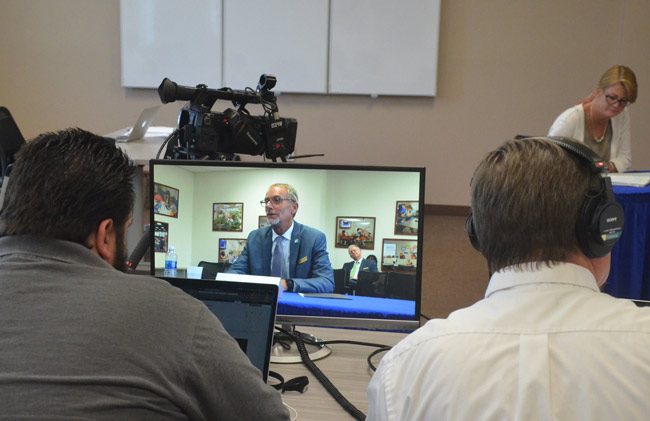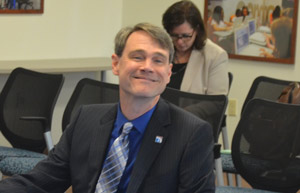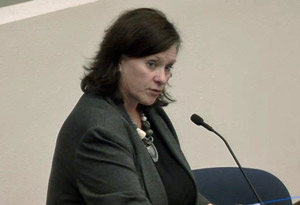
James Tager, the principal at Volusia County’s Atlantic High School, is the clear favorite to be named Flagler County’s next superintendent when the School Board convenes at 6 this evening to make its decision.
School Board members met in workshop at 9 this morning to discuss the three choices before them–Tager, Gerald Wilson and Jeff Umbaugh. It was their first chance to speak to each other since they had interviewed the candidates together and individually on April 20 and 21. Not that they did. Each board member provided summary reviews of their impressions of the candidates. They did not actually engage in conversation. But listeners did not need a degree in tea-leaf reading to grasp their leanings.
The board members found good things to say about each of the three candidates before them, but only Tager drew reviews that sounded all positive, with almost no caveats. If there was one, it’s his lack of experience as a superintendent, though he has a lot of district-level experience as a deputy superintendent. Umbaugh also lacks superintendent experience.
Board members spoke generously about the two other candidates. But those comments were more often in line with sharing comments in a “respectful and supportive way,” as they had been advised to do by the consultant who’s guided the board throughout the process, than in the more laudatory, endorsement-like language they used about Tager. At times, their comments about the two other candidates verged on the patronizing, especially regarding Umbaugh, whose rather oddball and effusive personality gave several members pause.
Based on this morning’s 50-minute discussion on the three candidates, Tager would be the board’s first choice, Wilson its second, Umbaugh its third.
Tager was the only candidate to win unanimous consent to be part of the interview pool last month, with Umbaugh winning three board members’ votes and Wilson just two. Umbaugh is a principal at a Clay County middle school, Wilson is not currently employed, his last stint as superintendent ending late last year in Maryland. Board members noted his lack of Florida experience as a disadvantage, but one compensated by his “intelligence” and “thoughtfulness,” two words that were not spoken in reference to Umbaugh, who kept being referred to, not necessarily flatteringly, as “energetic.”

Board member Andy Dance loved his interviews with Umbaugh and spoke of at one point engaging in a competition, with the two men trying to out-pun each other (neither of them seemingly recalling Ambrose Bierce’s admonition that punning is a “form of wit to which wise men stoop and fools aspire”). But Dance also was alerted to Facebook postings by Umbaugh that could be misinterpreted, and said Umbaugh’s “interjection of humor” in most situations is not “for everybody.” Dance did not explain why Umbaugh would then be a good fit for Flagler’s 1,700 employees and 13,000 students. When it came time for Conklin to speak, she echoed a few thoughts already spoken, then said: “I’m trying to think of something new to offer.” She did not find anything.
The consensus about Wilson is that he would be a good administrator with keen “insights” and, of the three candidates, the strongest command of curriculum. Dance said he “didn’t have a great first impression” of Wilson at the community meet-and-greet at Buddy Taylor Middle School the evening before the open interviews, where Wilson had brought his dog and told the crowd that he loved the district’s logo and was looking to relocate from Maryland. But Dance got to know him better and liked what he saw. “He’s a smart enough person that he could adapt to Florida,” he said, describing him as a “thoughtful planner.” (In several instances, as at the meet-and-greet, Wilson conveyed the impression of a man adroitly planning his retirement destination.)

About Wilson, Tucker was characteristically pithy: “He doesn’t’ have the Florida knowledge. Outside of this I think he’s a very capable man, and that’s about it.”
The contrast between board members’ reactions to Wilson and Umbaugh on one hand and Tager on the other was at its starkest not in terms of what the five members said about the first two, but about that they didn’t say about them—and what they did say about Tager.
They spoke about Tager for much longer than they did about the other two. There was no “that’s about it” about him. They had more to say about him, none of it cautionary. And what pleased them was his temperament, his humaneness, his skill with relationships—a presence and a level of comfort within himself and toward others that radiated in a way that did not with the other two candidates—and, above all, his points of reference. Those weren’t “data” or “articles” or briefing papers, but actual students. Tager appeared grounded in the everyday realities of the lives of students and faculty, giving him what Conklin described as an “empathy” for the human beings behind the numbers. “Students are not simply standards on a list, so that impressed me,” said Conklin, who happens to be the longest continuous-serving elected official on any of the county’s government boards, and who’s hired four superintendents so far, not always to her liking. “His focus was on students first.” She also liked his handling of a question about zero tolerance for its acknowledgment of shades of gray.
Barbosa keyed into Tager’s temperament. She described him as “very calm, he really spoke to me with eye contact, he was not nervous, he understood my accent, because many citizens have a hard time to understand me.” She found him to be “very capable,” and already well aware of the district’s programs.
His proximity to Flagler has helped: Dance pointed out that distinct advantage, as it’s allowed Tager already to have relationships with district officials. “I believe him when he says this is that job that he wants,” Dance said, “When he saw the opening he saw that it was a natural fit, and I think his strength will be through his familiarity and knowing the programs that have moved us forward, being able to stick with those.” Dance and Tuckler had opposed opening the hiring process nationwide. They had sought an internal candidate. Tager now appears at least peripherally to fit that bill while answering the other three board members’ interest in new blood. His handling of political turmoil after the Volusia School Board pushed out Superintendent Margaret Smith two years ago also pleased Dance for its earnestness. Tager left the district office to lead a high school again. “I think he is very principled, has a high character in order to identify things he’s uncomfortable with and moving on,” Dance said.
MacDonald actually took time to visit Tager in action at Atlantic High School in Port Orange, going there with her husband Dennis for a second opinion, and finding Tager as genuinely comfortable in his element as he was during his interviews. Tucker, of course, limited his remarks to the Cliffs Notes version, which he summed up in few words: “Calm.” “Confident.” “Answered directly.” Finances are his weakness. “Quality candidate.”
This morning’s workshop was for discussion purposes only. As always, the process was led by consultants from the Florida School Board Association, hired by the board to shepherd the search. The process was handled chiefly by the association’s Andrea Messina. It has been efficient but at times more stilted and stultifying than necessary, as with today’s workshop, which ended up not being a discussion at all but a series of mini-presentations by each board members about the points they’d gathered along the way.
Starkly, there was not a single exchange between them, not a single question from one board member to another, not one request for clarification, inquiry about this or that. No board member challenged another. As in previous meetings or workshops, the board embers’ interactions were as if walled off by the consultants’ rules, loose as those were, and each board member seemed to direct his or her comments to Messina, in a weirdly subservient student-teacher dynamic, than to each other, as in the more usual norms among searching, inquisitive elected officials making the most important decision of their tenure.

When the board meets tonight to vote on its choice for superintendent, board members will first take comments from the public—there were none today at the workshop—then vote by paper ballot on their choice. If a candidate gets three or more votes on the first ballot, the process is over: the board will then assign someone, likely its attorney, to negotiate a contract with that candidate. If the voting results in a tie, with two candidates getting two votes each, the third candidate will be dropped and board members will vote again, resulting in a top choice. The approach has again been prescribed by the school board association.
It would be surprising, after all that’s been spoken into the record, for the choice to veer from Tager at this point, for two reasons in particular: Tager appears poised to be not merely a pluralist candidate, as was the case with Oliva three years ago (he did not originally have the support of Conklin) but a unanimous choice. That would itself be something of a surprise for this board, which has been fracturing of late. The Tager decision could prove more unifying beyond the vote itself, giving this reconstituted board a renewed sense of cohesive identity it would not get from a divided vote. The second reason a vote for either Wilson or Umbaugh would be a surprise is that the two candidates now know that they would be winning the position more by default than by acclamation, and with less than unanimous support. Their tenure would be the continuation of fracture rather than the reset a more unified choice would bring.
But government boards are known to act in mysterious ways, with politics always the x factor of many decisions. This board has not been immune. And the eight hours between the board broadcasting its conclusions and actually taking a vote adds an unnecessary y factor. The school board association’s jagged process, which could have been circumvented with a decision this morning or immediately following the discussion, has now left the board vulnerable to more glaring contradictions, should the vote be out of line with its own revelations this morning.





























Leave a Reply